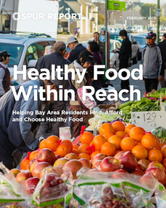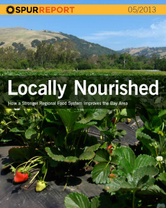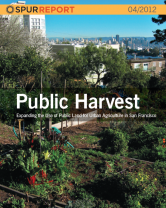Food and Agriculture
Strengthening the Bay Area's urban and regional food systems
Photo by Michael Waldrep
Photo by Michael Waldrep
From 2011 to 2024, SPUR ran a program focused on food and agriculture policy. In May 2024, the program started a new chapter as Fullwell, an independent nonprofit public policy group working to put an end to food insecurity and create a healthy, just, and sustainable food system. The team continues to focus on the same campaigns it originated at SPUR, only from a new home. Learn more at fullwell.us.
One of the biggest obstacles to healthy eating is the affordability of healthy food. Our Double Up Food Bucks California project helps families overcome that barrier. The project provides matching funds so that families and individuals participating in the CalFresh program can buy even more fresh fruits and vegetables at the grocery store.
The need for these food-based interventions in Medicaid has been exacerbated by the COVID-19 pandemic which highlighted many health and social inequities, especially for Black and Brown communities. This pandemic emphasizes the need to use food to treat and prevent chronic disease and to decrease the effects of health disparities and food insecurity on chronic disease.
 Healthy Food Within Reach
Healthy Food Within ReachOne in 10 adults in the Bay Area struggle to find three meals a day, while more than half of adults are overweight or obese. To meet our basic needs, improve public health and enhance our quality of life, Bay Area residents must have access to healthy food. SPUR recommends 12 actions that local governments can take to improve food access in Bay Area communities.
Read the report >>
 Locally Nourished
Locally NourishedThe Bay Area’s food system supports our greenbelt, employs hundreds of thousands of people, and helps reduce our greenhouse gas emissions. SPUR's recommends a series of policies to help us more effectively capture the benefits of our regional food system.
Read the report >>
 Public Harvest
Public HarvestUrban agriculture has captured the imagination of San Franciscans in recent years. But the city won't realize all the benefits of this growing interest unless it provides more land, more resources and better institutional support.
Read the report >>